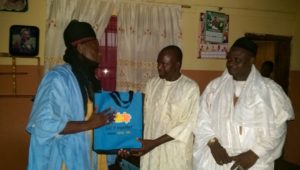By Longtong Ibrahim
Kaduna (Nigeria) – Some traditional rulers in southern Kaduna, North-west Nigeria, have endorsed the campaign of Child Birth Spacing (CBS) in their locality.

They include, Emir of Jema’a, chief of Fwangswan, Kaninkon, Kagoma and Godogodo chiefdom who gave their support when a five-man team from Nigerian Urban Reproductive Health Initiative (NURHI) paid them an advocacy visit at their various palaces.
The advocacy visit was aimed at gaining support and acceptance of Child Birth Spacing (CBS) in the various chiefdoms, where NURHI would promote the use of modern contraceptives, and support the provision of CBS services in selected primary health care centers of the localities.
Leader of the delegation, Bala Tijjani, while briefing the various chiefdoms said, the essence of the visit was to sensitize traditional rulers as heads of their communities on the importance of CBS, and how it can help reduce maternal and child mortality.
He explained that, the high rate of maternal and child mortality in the North-west region necessitated NURHI’s intervention to encourage child birth spacing, which will go a long way in reducing risks and mortality among women and children.
Tijjani further explained that, NURHI has implemented a five year program in seven LGAs in the state and its successes, led to the expansion of the project to 15 LGAs across the state.
He said, “The Organization has an intention of bringing health workers and family planning services through to be manned in your various Primary Health Centers. The test and services will be conducted free of charge.
“The organization is also making an effort to push for the signing into law a bill for the implementation of the Free Maternal and Child h Health bill, so that a budget line will be allocated for pregnant women and children less than five years. We have also met with the local government chairmen and they have made a commitment of N500, 000 annually to support the program. So I want to urge you to make sure you follow up so that, the money will be release,” he added.
While urging both traditional, religious and village leaders to sensitize their followers on the initiative, the team leader stressed that, “Humanly, we cannot stop dead, but there are measures that can be taken to prevent some things that result to death.
“The woman’s womb is like a balloon, when it is blown continuously, it will get tired and explodes one day. The womb needs some rest; when a woman take into family planning, it will help safeguard her womb and prolong her life to be able to take care of her family.
“Anything that affects the woman, affects the family and when she is safe, the whole community is safe,” he stressed.
The Emir of Jama’a, Alhaji (Dr.) Mohammad Isa Mohammad, who was represented by the Dokajen Jama’a, Yakubu Isa; Chief of Fwamgswan Chiefdom Mallam Musa Didam, represented by the Palace secretary, Patrick Isa; Tum Nikyop (Chief of Kaninkon), Mallam Tanko Tete; Kpog Gwong (Chief of Kogoma), Mr. Paul Zakka Wyom, represented by the Palace secretary, Saleh B. Kure; and the Chief of Godogodo, Mr. Iliya Ajiya Atang in their separate remarks, welcomed the initiative and supported its take off in their various chiefdoms.
In a remark, the Tum Nikyop, Mallam Tanko Tete, promised to support NURHI whenever they are in his domain.
According to him, “your work is of great importance, and I know it will differ from place to place. Here you will not find any difficulties. The few health centers here will be utilized but I don’t want a situation where people’s hope will be raise and later on, be disappointed. If you commence, make sure you finished it; so I am assuring you of our full support.”
Also speaking, the Kpog Gwong (Chief of Kogoma), Mr. Paul Zakka Wyom represented by the Palace secretary, Saleh B. Kure in a remark said, “We have 12 districts under our chiefdom. We also have JNI, CAN, and Youth Association in our community which is very organized. There are 13 rural hospitals and primary health care centers also; so, we will liaise with their heads and the various village heads to see that your project is successful.”